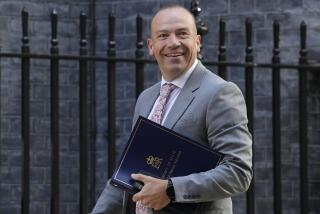Euphoria Over North Ireland Accord Ebbs : Conflict: Violence on either side in Ulster could upset the agreement, experts warn. IRA reportedly will study British-Irish declaration.
LONDON — Euphoria over the dramatic British-Irish accord on Northern Ireland subsided Thursday as experts questioned whether the 25 years of violence in that province would end anytime soon.
Moderate leaders in London, Dublin and Belfast remained cautiously enthusiastic about Wednesday’s declaration of a framework for peace in troubled Ulster (as Northern Ireland is also known), but political experts warned that violent action by Roman Catholic republicans or Protestant Unionists could easily upset the agreement.
The accord essentially invites the outlawed Irish Republican Army to lay down its arms and participate in negotiations on the political fate of Northern Ireland--but the guerrilla group’s inclusion rests on a commitment to forgo violence for at least three months.
Over the weekend, the IRA reportedly will be studying the British-Irish declaration and debating whether to lay down its arms and accept British Prime Minister John Major’s momentous offer of a place at the bargaining table.
The IRA leaders have acknowledged, Belfast political sources say, that the new framework agreed to by Major and Irish Prime Minister Albert Reynolds is the last chance for the group to participate in talks on the future of Ulster.
But so secret is the leadership of the IRA that no one knows how IRA members, hardened by years of violence in pursuit of a united Ireland, will react to the offer.
“The IRA may itself be split,” commented one official in Belfast on Thursday. “There is always the danger that an agreement could be reached with one segment of the militants--but not others, who would say: ‘You may agree, but we certainly don’t; the war continues.’ ”
Irish specialists say the goal of the IRA is an Ireland dominated by their own authoritarian party, and the group would be unlikely to renounce terrorism only to see its members excluded from power in democratic elections that could allow Ulster’s pro-British, Protestant majority to vote to remain part of Britain.
Furthermore, there are militant paramilitary offshoots, such as the Irish National Liberation Army, which might decide to conduct their own campaign of terror to disrupt any attempt at a settlement that would reflect anything less than a united Ireland.
And ramifications of the Wednesday accord may well upset the Protestant paramilitary groups in Northern Ireland.
As the Irish diplomat and journalist Conor Cruise O’Brien put it Thursday: “As the loyalist paramilitaries are also there, and no less formidable, attempts to appease the IRA can only further destabilize Northern Ireland.”
And as most Belfast observers can testify, the Protestant militants, in addition to being more numerous, are better organized and just as tough and determined as the IRA.
The Protestant paramilitary groups can count on 15,000 members, though only 1,000 or so are active soldiers. This compares with an active IRA membership of fewer than 500, according to British intelligence.
And “you have to remember,” said one specialist with wide experience in Washington and Northern Ireland, “that the Unionists in Northern Ireland have been there for 400 years.
“They don’t consider themselves recent settlers (any) more than Americans in the U.S. do. Also, they have provided tough troops--as well as field marshals--for the British army for several generations. They have a martial tradition and are not intimidated by the threat of civil war, by the IRA, the Irish Republic’s army or anyone else.”
Another official added, “There are still deep, fundamental religious differences here. The Protestants really hate the Church of Rome and its leader, the Pope. The thought of being united under a Catholic Ireland simply (is abhorrent to) them.”
Religious differences have been translated into economic differences. Unemployment among Catholics is twice as high as among Protestants.
“Ulster history has evolved into a have-have not situation,” said one observer there, “and that only aggravates the differences between the two communities.”
Many rank-and-file Unionists in Northern Ireland fear that the British government is in the process of abandoning London’s commitment to Ulster’s 1 million Protestants. Thus the Wednesday peace initiative was full of phrases insisting that Ulster’s Protestant majority would have the final say in any vote or referendum on joining the Irish Republic.
Perhaps the more positive aspect of Wednesday’s pact is that, having been given the opportunity to attend a peace conference, the IRA would suffer the odium of having rejected the pact if it decided to renew a campaign of violence.
More to Read
Sign up for Essential California
The most important California stories and recommendations in your inbox every morning.
You may occasionally receive promotional content from the Los Angeles Times.










